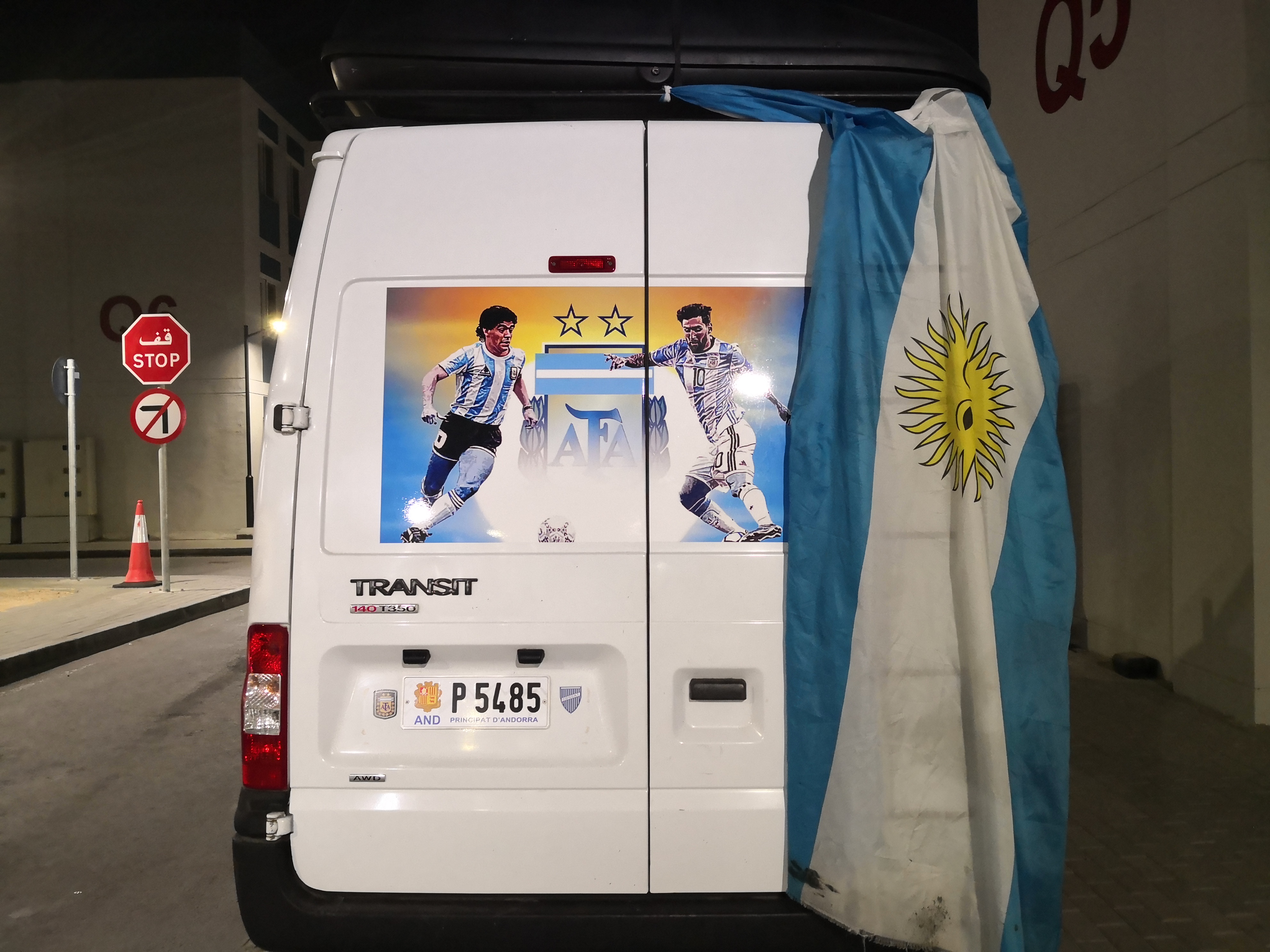
Al Wakrah, Qatar – The enticing smell of chargrilled meat fills the air, Argentinian music blares from portable speakers and a game of cards ends with high-fives and smiles.
This is a routine sight at the sprawling apartment complex in Al Wakrah City, southeast of Doha, that Argentinian football fans have turned into a little piece of home.
Barahat Al Janoub, or Barwargento as its current occupants call it, may be more than 13,000km (8,078 miles) from Buenos Aires or Rosario but fans who live here have not let distance get in the way of their pre-match customs and extended post-match celebrations – of which there have been many for Argentina’s supporters.
The biggest was after Argentina’s semifinal win over Croatia.
🇦🇷 Así festeja la hinchada argentina el pase a semis de la #CopaMundialFIFA. ¡Fiestón del Mati Teclas en el #Barwargento! 🎹 🎶
¡5:30 am en Doha nadie duerme! pic.twitter.com/zuqMGkfGkG
— Copa Mundial FIFA 🏆 (@fifaworldcup_es) December 10, 2022
Mattias, who arrived in Qatar from Argentina at the beginning of the World Cup, said he kept singing and dancing until the early hours of the following morning because it was a “once-in-a-lifetime moment” for him.
“We don’t know if we will watch Argentina play another World Cup final so we wanted to make the most of the occasion and celebrate until we collapsed,” he told Al Jazeera outside his apartment in Barwargento.
Videos posted on social media showed a fan playing music from his electric keyboard as dozens gathered around him to sing some of their most famous football songs and shake their arms in the signature rhythmic back-and-forth motion.
“The culture of singing songs before and after matches originates from club football in Argentina and we just change the lyrics of the songs to suit the national team and players,” Mattias explained.
Music is not the only part of Argentinian culture the fans have brought with them to Qatar. Pre-match singing and post-match celebrations are always paired with a group barbecue because all the singing and jumping require energy, Mattias says.
Be it some chicken and vegetables cooked by a few friends, or whole lambs shared among large groups, some kind of grilling has to be done to complete the list of Argentinian match-day rituals.
Tatiana Quartucci, who travelled to Qatar from Rosario, said barbecues go along with every special occasion back in Argentina. And no occasion can be more momentous than a World Cup final.

“On Sunday, we will all dress up in our Argentina shirts, gather in the centre and have a big barbecue to last us until the end of the match,” Quartucci said.
Free shuttle buses arranged by tournament organisers will transport the fans to Lusail Stadium. If videos posted before Argentina’s earlier knockout games are anything to go by, the buses will shake with the ferocity of singing and dancing fans all along the 45km (28 miles) journey.
“We start singing before boarding the buses and don’t stop until we reach the stadium,” Mattias said, adding that the singing resumes inside the stadium before and carries on in Barwargento until after sunrise.
According to the Argentinian embassy in Doha, at least 35,000 Albiceleste fans have made the long journey to Qatar. While some left after the first few matches, most stayed to rally around their team in the knockout stages.

Argentinian flags hang from balconies, lamp posts and even large rubbish bins in every corner of the Barwargento apartment complex. Some of these flags have images of Diego Maradona and Lionel Messi printed on them, while others simply indicate which part of Argentina the fans have come from.
“We have brought our towns, villages and football clubs with us to show that all of Argentina is behind the team,” Mauricio, a fan who travelled from Argentina’s southernmost city of Ushuaia, said while holding up his island’s flag.
Mattias, who comes from Rosario, admitted that nerves will start jangling once the countdown to the final approaches but it will not stop him from belting out “Vamos Argentina” at the top of his lungs as he boards the bus on Sunday afternoon.
“We are here in big numbers and we are here to win the World Cup,” he said with a raised fist.
While brightly-coloured buses in tournament livery will transport the fans, they’re hope “La Scaloneta” will take Lionel Messi and his team to the promised land.


In recent years, under the leadership of coach Lionel Scaloni, the Argentinians got a new nickname – La Scaloneta, a combination of “Scaloni” with the word for van or bus (camioneta) “the Scaloni Bus”, or the bus driven by Scaloni.
Barwargento has its own La Scaloneta – a small white van with images of Diego Maradona and Messi on the back. A large Argentinian flag is draped over one corner while the front is painted in the blue and white of the country.
La Scaloneta, according to Mattias, represents the dream of millions of Argentinians. The driving force behind the dream is coach Lionel Scaloni.
“Scaloni has taken the team to unprecedented success since taking charge in 2018, and we are sure that he is the one who will drive us to glory,” he said.







